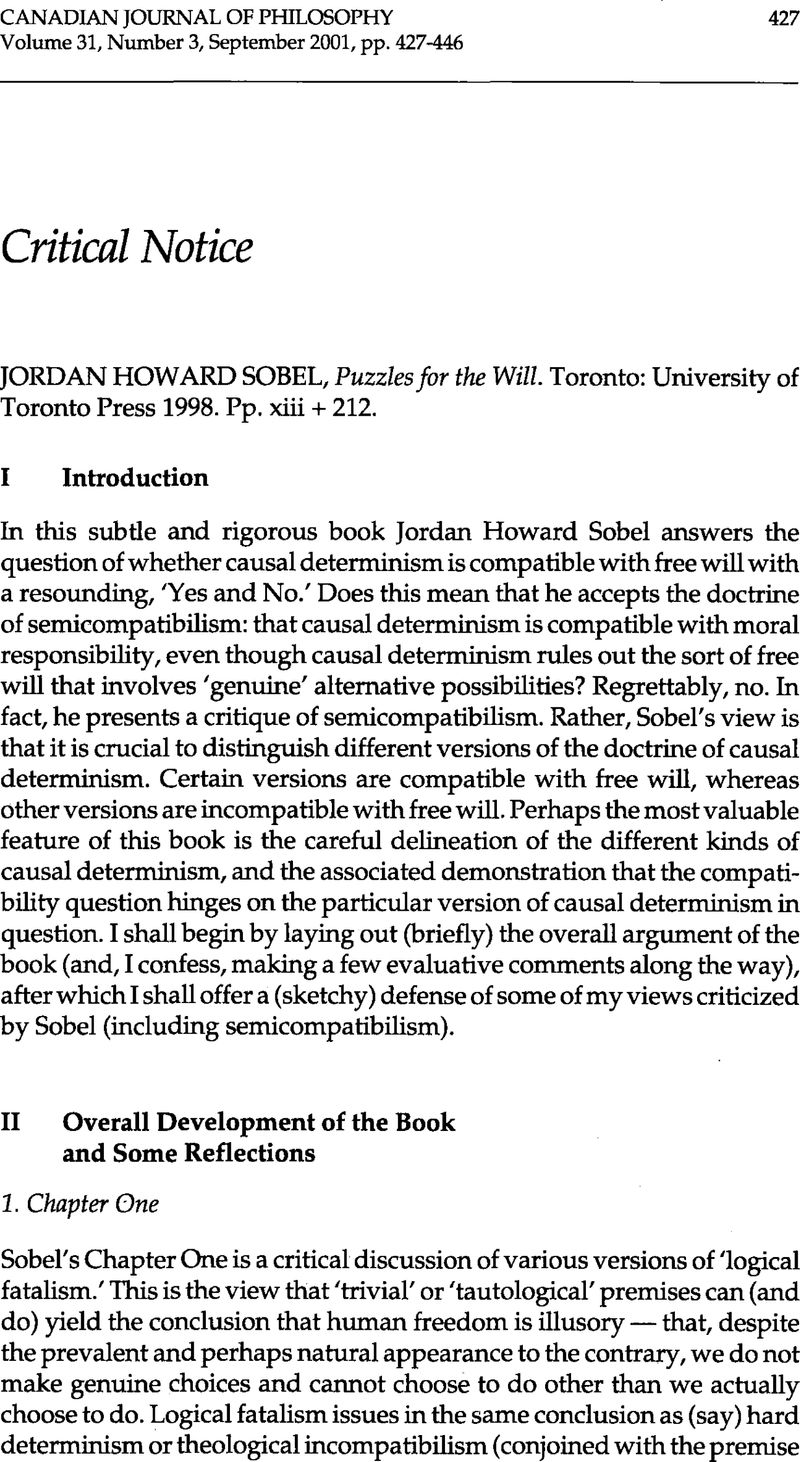Published online by Cambridge University Press: 01 January 2020

1 For discussions of two sorts of control - regulative control and guidance control, see: Fischer, John Martin The Metaphysics of Free Will (Oxford: Blackwell 1994)Google Scholar, especially 131-89; and Fischer, John Martin and Mark Ravizza, S.J. Responsibility and Control: A Theory of Moral Responsibility (Cambridge: Cambridge University Press 1998)CrossRefGoogle Scholar.
2 For Van Inwagen's claim, see Inwagen, Peter Van ‘When is the Will Free?’ in Tomberlin, J. ed., Philosophical Perspectives Vol. 14, Action Theory and Philosophy of Mind. (Atascadero, CA: Ridgeview Publishing Company 1990) 399–422Google Scholar; and ‘When the Will Is Not Free,’ Philosophical Studies 75 (1994) 95-113. There is a reply in Fischer, John Martin and Ravizza, Mark ‘Free Will and the Modal Principle,’ Philosophical Studies 83 (1996) 213–30CrossRefGoogle Scholar.
4 For various levels of irritation and alarm, bordering in some cases on apoplexy, see Van Inwagen, ‘When Is the Will Free?’ and ‘When the Will Is Not Free’; and Warfield, Ted ‘Review of John Fischer's The Metaphysics of Free Will,’ Faith and Philosophy 14 (1997) 261–5CrossRefGoogle Scholar, and ‘Causal Determinism and Human Freedom are Incompatible: A New Argument for Incompatibilism,’ forthcoming in Tomberlin, ed., Philosophical Perspectives. There are replies in Fischer, John Martin and Ravizza, Mark ‘When the Will is Free,’ in Tomberlin, J. ed., Philosophical Perspectives Vol. 6, Ethics (Atascadero, CA: Ridgeview 1992) 423–51Google Scholar; and ‘Free Will and the Modal Principle’; and Fischer, John Martin ‘A New Compatibilism,’ Philosophical Topics 24 (1996) 49–66CrossRefGoogle Scholar, reprinted in Ekstrom, Laura Waddell ed., Agency and Responsibility: Essays on the Metaphysics of Freedom (Boulder, CO: Westview Press 2001) 38–56Google Scholar.
5 Fischer, The Metaphysics of Free Will, 228n.43Google Scholar
6 For a more detailed development of this argument in response to Van Inwagen (‘When Is the Will Free?’ and ‘When the Will Is Not Free’) and Warfield (‘Review of John Fischer's The Metaphysics of Free Will’ and ‘Causal Determinism and Human Freedom are Incompatible: A New Argument for Incompatibilism’), see Fischer, ‘A New Compatibilism.’
7 Pereboom, Derk ‘Determinism al Dente,’ Nous 29 (1995) 21–45, esp. 27CrossRefGoogle Scholar
8 Sobel, Jordan Howard ‘Critical Notice of John Martin Fischer, The Metaphysics of Free Will: An Essay on Control,’ Canadian Journal of Philosophy 28 (1998) 95–117CrossRefGoogle Scholar
9 Nozick, Robert ‘Newcomb's Problem and Two Principles of Choice,’ in Campbell, R. and Sowden, L. eds., Rationality, Cooperation, and Paradox: The Prisoner's Dilemma and Newcomb's Problem (Vancouver: University of British Columbia Press 1985) 107–33Google Scholar, esp. 114-15. (Abridged from Rescher, N. et al., eds., Essays in Honor of Carl G. Hempel (Dordrecht: Reidel Publishing Company 1969) 114–46.)CrossRefGoogle Scholar
10 ‘Counterfactuals and Newcomb's Problem,’ Journal of Philosophy 78 (1981) 331-56
11 Fischer, The Metaphysics of Free Will, 105-6Google Scholar; Sobel cites this passage on 171-2 of Puzzles for the Will.
12 I have discussed these issues in Fischer, John Martin ‘The Metaphysics of Free Will: A Reply to My Critics,’ Journal of Social Philosophy 29 (1998) 157–67CrossRefGoogle Scholar, esp. 157-60, where I am replying to Ginet, Carl ‘Comments on John Fischer, The Metaphysics of Free Will,’ Journal of Social Philosophy 29 (1998) 126–34CrossRefGoogle Scholar. For a particularly helpful defense of the view that one can usefully deliberate and engage in practical reasoning, even in a context in which one knows that there is just one alternative genuinely available to one, see Bok, Hilary Freedom and Responsibility (Princeton: Princeton University Press 1998), esp. 110–14CrossRefGoogle Scholar. There are also useful discussions of the possibility of deliberation in the absence of alternative possibilities in John Martin Fischer, Robert Kane, and lshtiyaque Haji, ‘Free Will and Moral Responsibility: Three Recent Views,’ Proceedings of the 1999 Greater Philadelphia Philosophy Consortium at Bryn Mawr College, McKenna, Michael ed., Journal of Ethics (2000) 1-91Google Scholar.
13 In The Metaphysics of Free Will, I claimed that the asymmetry between mere inerrancy and infallibility was suggested (although not defended) by Robert Nozick. Sobel points out that Nozick never explicitly addressed the relationship between these two sorts of predictors, and thus did not endorse the asymmetry in question (172-3).
I appreciate the correction, in no small measure because it has revealed that I had previously considerably underestimated my originality.
14 Fischer, The Metaphysics of Free Will, esp. 120-5Google Scholar
15 Pike, Nelson ‘Of God and Freedom: A Rejoinder,’ Philosophical Review 75 (1966) 369–79CrossRefGoogle Scholar
16 See, especially, Fischer, John Martin ‘Frankfurt-Style Compatibilism,’ forthcoming in Buss, S. and Overton, L. eds., The Contours of Agency: Essays in Honor of Harry Frankfurt (Cambridge, MA: The MIT Press 2002)Google Scholar.
17 For a more detailed defense, see my ‘Frankfurt-Style Compatibilism.'
18 As I pointed out above, there is a detailed and thoughtful defense of this thesis in Bok, Freedom and Responsibility.
19 For an additional defense of my approach to Newcomb's Problem, see my ‘Newcomb's Problem: A Reply to Carlson,’ Analysis, forthcoming. I and my co-author offer a further development and defense of semicompatibilism in Responsibility and Control. I am grateful to Jordan Howard Sobel for his helpful and gracious comments.